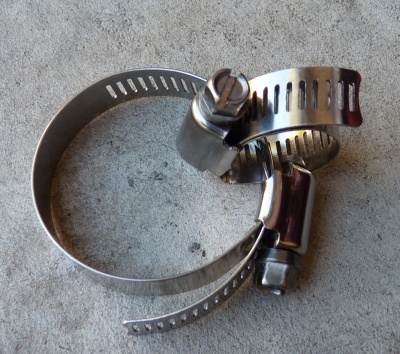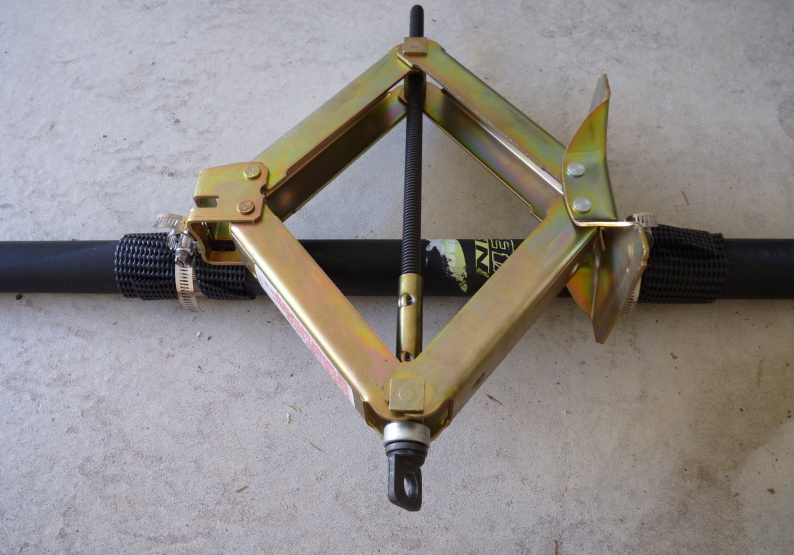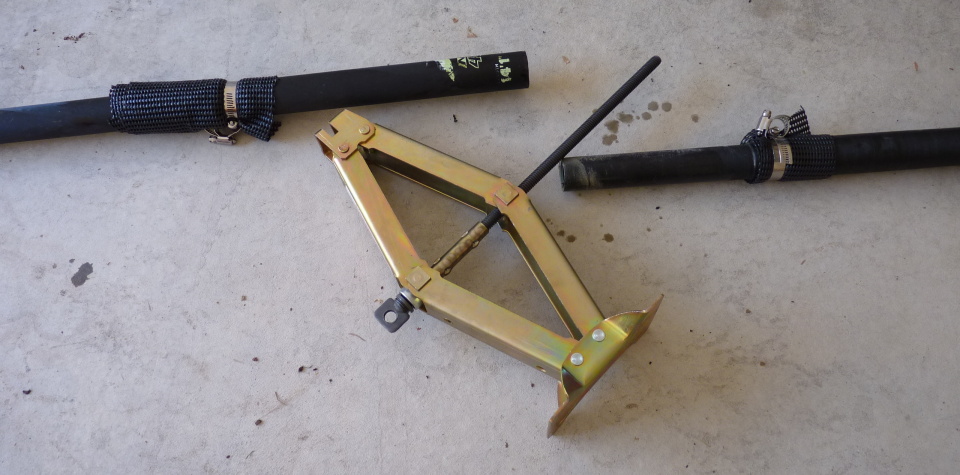My new track - Neon Spark
I wrote another track - “Neon Spark”. Here it is:

Artwork: Triumph by ba8y6irl
I wrote another track - “Neon Spark”. Here it is:

Artwork: Triumph by ba8y6irl
I’ve been windsurfing a few years but I didn’t have my own board. Whenever I wanted to go for a ride, I rented a board from SHQ at Sandringham beach. That was Ok, and I had a lot of fun, but I was confined to a single location. Besides, SHQ only has beginners’ large boards and small sails available for rent, and after some time riding on them started to feel dull.
Therefore, I recently succumbed and bought a second hand board, complete with a mast and a few sails. Now, when I have my own board, I can ride anywhere at any time, and rig whichever sail suits me best. But owning my own board also adds hassle of transporting it, storing, rigging and unrigging.
But probably the most frustrating experience a windsurfer can have is a stuck mast. A modern windsurfing masts are made of glass fiber or carbon fiber and consist of 2 parts: top and bottom, connected together with a ferrule. The parts fit together very tight, and if even a little sand gets into the ferrule, then the mast can become “stuck”, and it will be virtually impossible to separate by hand.
That problem is very common, and Google suggests lots of different solutions: playing a team tug of war with the mast, twisting the two parts in opposite directions using booms as levers, pouncing on the middle point on the mast to flex it to grind the sand, filling it with pressurized water, or even pulling the mast apart with a truck. Unfortunately, the first time it happened to me I was on my own with nobody to help, I didn’t own a truck. So, I came up with my own innovative solution.
I got 4 hose clamps from Bunnings: two 33-57mm to fit around the mast and two 17-32mm. I’ve put the smaller clamps around the side of each of the larger ones.

Then put the large clamps on the mast to each side of the joint point with rubber mats as a padding between the clamps and the mast. I left enough space between the clamps because I didn’t want to clamp down on the ferrule joint itself. Then tightened the clamps as much as I could.

Then I stuck the car jack between the clamps and slowly started jacking up. The smaller clamps' rings provide support for the jack.

After a while I heard a cracking noise but no effect. I released the jack, loosened the clamps and rotated them on the other side of the mast. Then I jacked up again. After a few minutes of that the mast finally started to come apart, and I finally had it in 2 pieces again!


I listen to a few podcasts every week. These are weekly shows I’m subscribed to and listen to every episode. My most favourite one is Freakonomics Radio. I love that show because every week Stephen Dubner and Steve Levitt take ordinary ideas we are so used to that we don’t even pay attention to them, and turn them on their heads. Just like Mythbusters blow things up “for science”, the Freakonomics’ authors turn conventional wisdom inside out, all in the name of economics. I love their show, and I think you too should subscribe and listen to every episode they produce. But if you have time for one episode only, you should listen to the one called “The Upside of Quitting”. In fact, it is so great that even if you have no time at all, you will still have no excuse for not checking it out. In that episode they put forward an unconventional idea that sometimes quitting may be good for you.
‘Really?’ you might ask, ‘After all that Winners never quit and quitters never win?’ 1
Indeed, the modern culture paints an image of successful people as someone who always persist in their endeavours no matter what. While I’m not saying that it is entirely wrong, (in fact, that course of action may even be correct most of the time), but still sometimes it is wrong. The problem with persisting no matter what is that after some time you may forget why you’ve been doing what you do. You lose focus. In that case you need to stop and ask yourself why are you doing that. And if you can’t answer, then the best thing you can do is to quit. The most valuable resource we have in our lives is time. No matter how rich we are, we can’t buy more than 24 hours a day, and we can’t buy additional years of life, at least not yet. And the things we do consume our time, they eat away the time of our lives. So, why would we spend our lives doing things unless they give us something, unless they bring us closer to our goals?
We all have goals in life. The goals like “exercise more”, or “become financially independent”, or “spend more time with our families”. In order to reach our goals we need to be focused on them, dedicate our time to them. And because our time is limited, that means we have to stop doing anything that sabotages our goals.
Don’t get me wrong, I’m not saying that it should be all work and no play. We all need time to rest. Taking time off and having hobbies is ok. But if you’re playing, you need to clearly realise that you’re indeed playing. If you’re watching TV then, unless you work in a TV industry, you are most likely not doing it for your career. Likewise with hobbies: they are something we like to be engaged in, but they don’t bring us closer to our goals. If we don’t understand that, then those activities end up consuming too much of our time, and instead of bringing us closer to our goals, they take us further away.
I’ve quit a lot of things in my life. But I didn’t realise why I wanted to quit them until recently, it just felt like the right thing to do. However, nowadays I apply a ruthless framework to everything I do: I ask myself if I know why I do what I do, and if it brings me closer to at least one of my goals (and I have many). And if I can’t answer that question, I quit.
A few years ago I quit Aikido after dedicating more than 10 years to it. And for the last couple of years of those 10 I couldn’t explain why I was still training. I didn’t enjoy it any more, it wasn’t that good exercise and I felt like I stopped learning anything from it. Then I realised that I just kept doing that because it became a habit. Just a habit with no real reason behind it. And the moment I understood that, I quit. Instead of Aikido I joined a gym and yoga sessions. Gym provides more intense workouts within shorter sessions, and yoga for me has all the advantages of nurturing mind-body awareness without the Aikido’s downsides. I’d like to emphasize that it is my personal experience, it made sense to me, but for someone else an opposite direction might make more sense.
So, if you’re doing something and you don’t know why, why don’t you stop and ask this question, And if you can’t find an answer, then maybe it is time to quit.
Vince Lombardi. (n.d.). BrainyQuote.com. Retrieved September 25, 2015, from BrainyQuote.com ↩︎
Today I was informed that my position was made redundant. I have been here for 3 years and I enjoyed it, but it will soon be over, and I will be on the market again looking for new job. I am a bit disappointed but other than that I’m fine – I’ve been through that before. When something ends, it also manifests a beginning of a new chapter. There is no use to obsess over what has already happened. Instead I need to look into the future and decide what I am going to do next.
As I know from my previous experiences, it starts with a feeling of euphoria. When a job ends, I would be overwhelmed with a feeling of freedom. “This time,” I would think, “I have a chance to find a job I will truly love. Oh maybe I will start my own business. I can do whatever I want — the sky is the limit!” But not long after that I would start applying for jobs exactly like the one I had before. After a few weeks a depression would slowly creep in. By that time I would be spending most of time on the job boards frantically refreshing the search page trying to pick up job ads which have just been posted. I would apply for multiple jobs a day, and still would be getting very few, if any, replies. Then after another couple of weeks I would become desperate. And the feelings of freedom and purpose I had in the beginning would be long gone…
However, I decided that this time it will be different. Here’s what I am going to do:
I have a few rare skills which used to pay good money, but the demand for them was falling over the last few years. In order to stay employable I need to increase the size of my professional markets, and that means learning skills which are in demand.
Specialising on particular product can be extremely financially rewarding. Specialisation allows you to build better skills in your particular area. And almost in any area highly skilled professionals earn more money. The problem with this approach is that the vendor of the product you are concentrating on may go out of business, or the product may become obsolete, and with that your expertise will become obsolete too. And for a professional with a narrow specialisation field it may be very hard to retrain into another knowledge area.
Fundamental skills, on the other hand, provide more breadth of application. Those are skills like programming languages or widely adopted platforms which are supported by more than one vendor. The best fundamental skills to adopt are the ones which present popular rapidly evolving technologies. Although it may be hard to keep up with them, it is unlikely that they will come out of existence soon.
I enjoy learning almost above anything else. Whichever new professional field I choose, it will be the one that will force me to learn new things all the time, keeping me on my toes. That will satisfy my hunger for learning, and will increase my expertise at the same time. Hopefully it will result in better remuneration as well.
Although contract jobs may last for a long time, they are by definition temporary. Contractors agree to forego bonuses, salary increases, paid annual and sick leaves. In return, they are usually compensated for those things with money. Because company-driven career grown is mostly thing of the past anyway, I view contracts as more fair arrangements. Therefore, I will try to avoid dead-end permanent jobs. Instead I will prefer contracts or permanent jobs which present opportunities to learn valuable skills or provide genuine growth paths.
That’s it, quite a manifesto. I will report back here on how it is going.
Jim Sinegal, co-founder and former CEO of Costco, is one of the most influential business leaders of our time. Motley Fool recently recorded an interview with him, “Costco’s Winning Formula”. The whole conversation is packed with wisdom. But one quote caught my particular attention:
If you find yourself involved in something that you don’t truly love and feel passionate about, run, don’t walk, to the fastest exit and get out of there and get yourself involved in something you truly can become passionate about. Because if you do that, you’ll never have to work another day in your life.